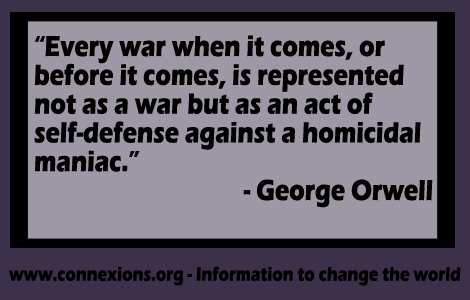Other Voices: The Connexions Newsletter
October 15, 2016
This Issue: Lurching to War
There was a moment, after the long nightmare of the Cold War ended a quarter of a century ago, when it seemed as if the danger of war had finally diminished. To be sure, there has never been a moment in all those years when wars weren’t raging somewhere, but at least the possibility of nuclear war, we hoped, was less.
Foolish optimism. The risk of nuclear war is as great now as it was at the height of the Cold War. From the time the Warsaw Pact dissolved itself and the Soviet Union collapsed, the United States has single-mindedly pursued a hyper-aggressive strategy of surrounding Russia with hostile military forces and missiles aimed at the Russian heartland. The long-term goal is to bring about the collapse and dismemberment of the Russian federation, with the pieces that emerge subsequently turned into U.S. client states that provide raw materials but don’t compete with American corporations or America’s military. In a parallel strategy (the “pivot to Asia”) the U.S. is making increasingly threatening military moves off the coast of China.
Those who thought that the collapse of the nominally socialist Soviet Union, and the transformation of China into a capitalist powerhouse, would mean an end of American hostility to those two ‘communist’ countries, failed to recognize that what the U.S. seeks is world dominance. It doesn’t want capitalist competitors; it wants capitalist client states. Russia and China stand in the way of the U.S. agenda because, even though they can’t match U.S. military or economic power, they are strong enough to assert their independence. They are therefore seen as increasing threats as they pursue projects, such as major railway and pipeline projects, which would be outside U.S. control. Capitalism hates competition, and the U.S., the world’s dominant capitalist power, has never tolerated competitors, rivals, or leaders who dare to put their own country ahead of U.S. interests. If small countries like Grenada, El Salvador, and Nicaragua have to be crushed if they act independently, then, from the point of view of the U.S. elites, Russia and China are much greater threats to American hegemony which cannot be tolerated.
One of the driving forces underlying U.S. aggression and militarism has always been the military-industrial complex, arguably the most important sector of the U.S. economy. There are enormous profits to be made in supplying weapons and military systems, and therefore in inventing threats and stoking conflicts. The economies of many of the NATO states are highly integrated into this militarized economic system, making their elites willing accomplices in U.S. militarism.
Perhaps the most dangerous element in this picture is the fact that the American ruling elite is so used to getting its own way, domestically and internationally, that they have become increasingly oblivious to the dangers of what they are doing. Voices of sanity within the elite are increasingly marginalized by those are prepared to risk, and even plan for, all-out war. The ominous parallels to the outbreak of World War I a century ago are all to apparent.
In a long list of irresponsible actions, perhaps the most appalling are the actions the U.S. has been taking in relation to nuclear weapons. They have officially announced that they no longer adhere to the “no first strike” pledge that both Russia and the U.S. made during the Cold War. Now the U.S. says that it might (again) use nuclear weapons first in a conflict. The Russians and the Chinese, who well remember Hiroshima and Nagasaki, are undoubtedly taking this aggressive posture into account in their own contingency planning.
As if this weren’t enough, the U.S. is also looking a developing “mini” nuclear weapons, an act of madness that makes “sense” only if you intend to use them. And now the U.S. is starting to deploy anti-missile systems right on the Russian border. The sole use of such system would be to prevent retaliation after an American first strike. It is equivalent to declaring an intent to attack Russia when it judges the time is ripe. Inevitably this will force the Russians to be on higher alert, increasing the risk that a provocation will turn into an all-out war.
In this issue, we take a close look at the risks we face as we lurch ever closer to war. We especially look at the role of the mainstream media in manufacturing justifications for war.
As always, we invite you to share this newsletter with your friends. You can forward this email, or send them the link to the Other Voices home page on the Connexions website at www.connexions.org/Media/CxNewsletter.htm.
If you'd like to subscribe and receive this newsletter by email every two weeks, please use this form.
Your feedback is appreciated - and so are donations to keep us doing what we're doing!

Topic of the Week
War Propaganda
The United States and its NATO allies have increasingly come to see war, not as a disaster to be avoided, but as a normal tool of foreign policy. Getting the public to acquiesce in regarding war as inevitable and justifiable requires a polished propaganda machine. The mainstream media are exactly that. Always reliable propagandists for any war, today they provide unquestioning support for militarism and aggression, up to and including all-out war. For critical analyses of war propaganda, check out the Connexions Subject Index here.
This Week on Connexions.org
Containing the United States
With Hillary Clinton about to be elected and some advanced cadres of the war party preparing to take charge, who is going to contain the United States? The U.S. political system has failed its populace and the world and has imposed no brakes on the war machine. The UN and EU are still too much under the U.S. thumb. Russia and China are too weak and with too flimsy an alliance system to threaten U.S. hegemony and do more than make direct U.S. aggression against themselves very costly. Read more
Keywords: Propaganda - U.S. Imperialism
Provoking Nuclear War by Media
The United States, says John Pilger, is pursuing a long-term strategy of destroying Russia. The strategy includes encircling Russia with hostile regimes and with missiles stationed on Russia’s borders. The U.S. ruling elite, aided and abetted by the mainstream media, is willing to run the risk of nuclear war to achieve its goals. Hilary Clinton, who publicly rejoiced at her executioner's role during the destruction of Libya, has repeatedly indicated that, as president, she will "go further" than Obama. Read more
Keywords: U.S. Foreign Policy - War Propaganda
Beating the drums for war with Russia
The US ruling establishment is considering an escalation of US intervention. Such an escalation carries the very real threat of provoking a wider war. Read more
Keywords: U.S. Imperialism - War Propaganda
Western Propaganda: So Simple But So Effective
Western propaganda is actually a perfect apparatus! It is effective and it is almost fully ‘bulletproof’. It ‘works’! European empires have been refining it for many long centuries, and the European offspring – the United States – has elevated it to almost total perfection. One precondition for its success is, of course, that the Western political and economic regime owns almost all the major media channels and distribution outlets of the world. Diversity can never be tolerated. It could smash the idiocy! Once this prerequisite is completed, things get relatively relaxed and cozy for the demagogues in Washington, London and Paris. Read more
Keywords: Media Propaganda - Propaganda
Propaganda Techniques of Empire
Washington’s quest for perpetual world power is underwritten by systematic and perpetual propaganda wars. Every major and minor war has been preceded, accompanied and followed by unremitting government propaganda designed to secure public approval, exploit victims, slander critics, dehumanize targeted adversaries and justify its allies’ collaboration. James Petras discusses the most common recent techniques used to support ongoing imperial wars. Read more
Keywords: Propaganda - War Propaganda
Liberal Antiwar Activism is the Problem
The sad state of the antiwar movement in the United States, says Victor Emanuele, “breaks my heart.” “Peoples’ lives around the world depend on those of us in the U.S. to create movements capable of stopping Uncle Sam’s imperial madness. So far, we’re losing. And in many ways, we have no one to blame but ourselves.” Why, Emanuele asks, don’t more working-class and poor people join antiwar organizations or attend leftist political events? Because, he says, “the Left is a fucking weird place.” Read more
Keywords: Antiwar Movement - Liberal Left
Website of the Week
Antiwar.com
A website site devoted to the cause of non-interventionism. Initially founded to fight against intervention in the Balkans under Bill Clinton's presidency, it now campaigns against militarism and imperialism generally. Antiwar.com's readers include libertarians, pacifists, leftists, greens, and independents, as well those on the Right who agree with its opposition to imperialism. Antiwar.com's "politics are libertarian: our opposition to war is rooted in Randolph Bourne's concept that 'War is the health of the State.'" Find them here
Keywords: Antiwar Movement - Militarism
Book of the Week
Why are we the good guys?
By David Cromwell
One of the unspoken assumptions of the Western world is that we are great defenders of human rights, a free press and the benefits of market economics. Mistakes might be made along the way, perhaps even tragic errors of judgement. But the prevailing view is that the West is essentially a force for good in the wider world. Why Are We The Good Guys? is a provocative challenge of this false ideology. Read more
Keywords: Ideology - Media Propaganda
Film of the Week
Free State of Jones
A film inspired by the life of Newton Knight and his armed rebellion against the Confederacy in Jones County, Mississippi, during the American Civil War. Official website
Keywords: Slave Revolts - U.S. Civil War
Organizing
The Importance of Making Trouble
In this interview, Frances Fox Piven suggest that “people make gains when they become defiant, disorderly, and unruly. And the gains are crafted to make them orderly again. That’s okay, provided that there is a price, that there are concessions, that there are reforms. That’s how we made some steps forward... We’ve also made a lot of steps backwards, but I think that’s because people haven’t risen up frequently enough, consistently enough. Read more
Keywords: Movement Building - Organizing for Social Change
People's History
Deep in the Swamps, Archaeologists Are Finding How Fugitive Slaves Kept Their Freedom
The Great Dismal Swamp was once a thriving refuge for runaways. Archaeologists are learning more about their free communities. Read more
Keywords: Anti-Slavery - Slavery
From the Archives
Exhuming history: censored Jewish text brought to light by Library and Archives Canada
Words that were once lost to history have been brought into the light by book conservationists at Library and Archives Canada. The 16th-century collection of sermons were by a rabbi and philosopher who sought to keep the faith alive during a dark era of persecution and censorship, when Jews were facing possible expulsion from their homes if they did not convert to Christianity. Read more
Keywords: Jewish History - Religious Persecution
Connexions Calendar
October 15, 2016
International Day of Rural Women
Rural women, the majority of whom depend on natural resources and agriculture for their livelihoods, make up over a quarter of the total world population. In developing countries, rural women represent approximately 43 per cent of the agricultural labour force, and produce, process and prepare much of the food available, thereby giving them primary responsibility for food security.
October 18, 2016
Pricing the Planet - Film
Economists, bankers, investment funds and financiers are taking a huge interest in the environmental crisis. They say they can protect the planet their way - with money. This two-part documentary investigates the declining state of our planet and whether a commercial approach can in fact save it. We see how since the Industrial Revolution we have heavily depleted our natural resources, polluted the planet, and how we are now losing endangered species at an alarming rate.
October 21, 2016
A Propaganda System: How Canada’s Government, Corporations, Media and Academia Sell War and Exploitation
The Toronto launch of Yves Engler’s book, which traces the long history of government information control during war, including formal censorship, as well as extreme media bias on topics ranging from Haiti to Palestine, investment agreements to the mining industry.
October 27, 2016
World Day for Audiovisual Heritage
The World Day for Audiovisual Heritage takes place every 27 October. This commemorative day was chosen by UNESCO (the United Nations Educational, Scientific and Cultural Organization) to raise awareness of the significance of and preservation risks recorded sound and audiovisual documents (films, sound and video recordings, radio and television programs). Events are held in many countries, organised by national and regional sound and film archives, broadcasters, museums and libraries, and major audiovisual associations.
The Connexions Calendar is an online calendar that exists to advertise events that support social justice, democracy, human rights, ecology, and other causes. We invite you to use it to promote your events. Adding events to the Connexions Calendar is FREE. We'll give you a username and password which you use to log on. Use the contact form to arrange for a username and password. Read more →
Seeds of Fire
October 16, 1859
The Raid on Harper’s Ferry
John Brown’s raid on Harpers Ferry begins. Brown and his group, all deeply committed to the anti-slavery cause, have planned the raid in the hope of obtaining guns, freeing slaves, and triggering an armed revolt against slavery.
October 18, 1803
Triumph of the Haitian Revolution
Haitian forces defeat the French army at Vertières in the last major battle of the Haitian war of independence. The battle ends French attempts to put down the Haitian Revolution and re-institute slavery.
October 23, 1956
Outbreak of the Hungarian Revolution
Demonstrations of students and workers march through Budapest. In the evening, police fire on unarmed demonstrators; demonstrators start seizing weapons, and fighting breaks out. The result is a revolution which overthrows the Hungarian government but is eventually crushed by the Soviet Union.
October 27, 1864
Founding of the First International
The founding convention of the International Workingmen’s Association (the First International) adopts its “General Rules” which will express the basic orientation of the International and guide its actions. Written by Karl Marx, they begin with the unequivocal statement “the emancipation of the working classes must be conquered by the working classes themselves” – an insistence that liberation can only be self-liberation, that it cannot be imposed or bestowed by an outside organization or leader.

Your support is needed to keep Connexions going
All of the work of the Connexions project is done by volunteers, but our expenses include rent, phone and computer costs and technical support, as well as expenses related to our ongoing project of converting printed archival materials into digital formats. You can make a one time or regular monthly contribution through the donate page on the Connexions website.
Bequests
Many of us have made working for social justice a lifetime commitment. If you are thinking about leaving a legacy for social justice that will live on, you might want to consider leaving a bequest to Connexions in your will. If you'd like to discuss this option, please contact us or see the Bequest page.




















